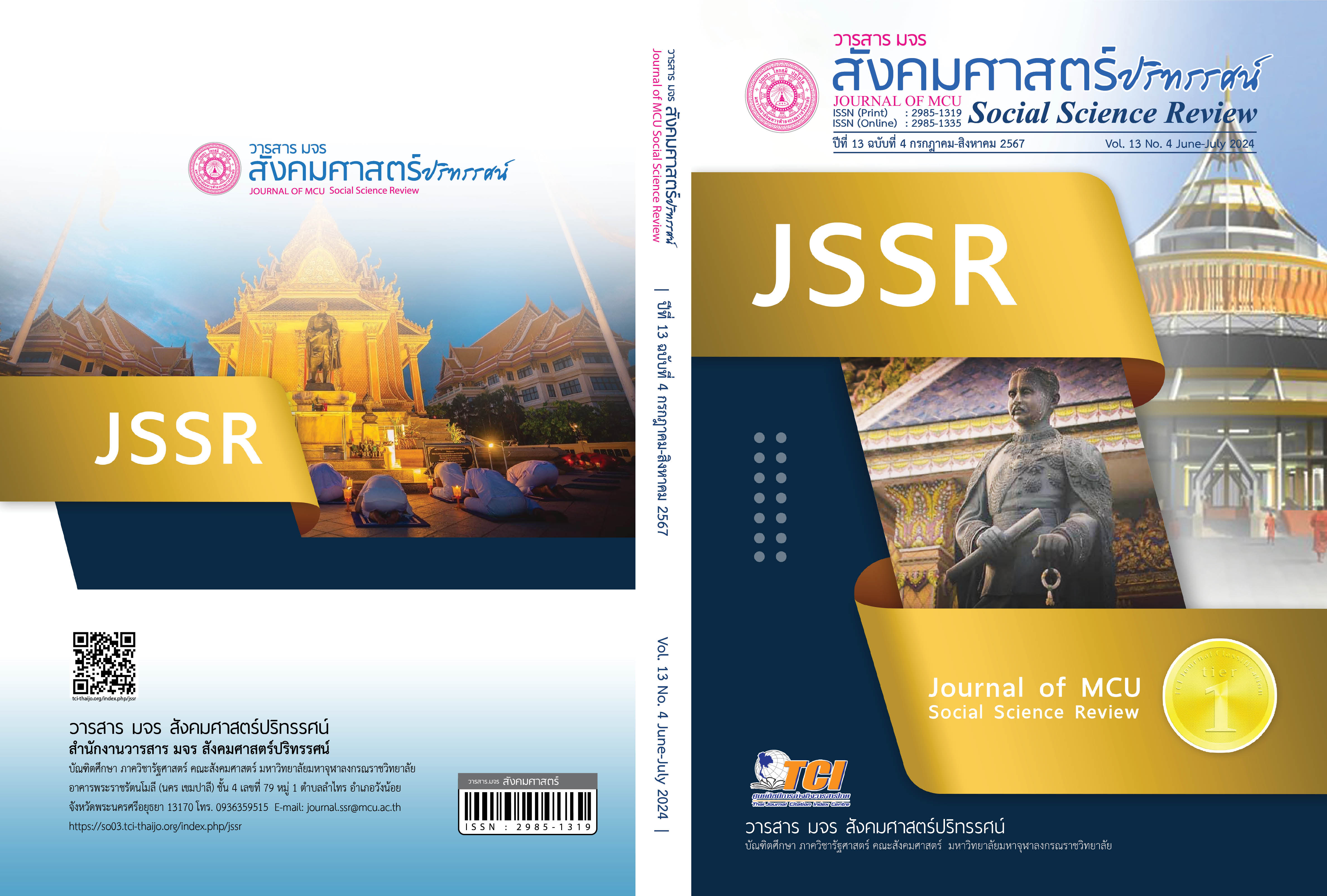การศึกษาตัวกำหนดคุณภาพการบริการที่มีอิทธิพลต่อความตั้งใจเชิงพฤติกรรมของลูกค้าที่ใช้บริการร้านอาหารเกาหลีในเขตกรุงเทพมหานคร
คำสำคัญ:
คุณภาพการบริการ, ความตั้งใจเชิงพฤติกรรม, ร้านอาหารเกาหลีบทคัดย่อ
บทความวิจัยนี้มีวัตถุประสงค์เพื่อศึกษาอิทธิพลตัวกำหนดคุณภาพการบริการต่อความตั้งใจเชิงพฤติกรรมของลูกค้าที่ใช้บริการร้านอาหารเกาหลีในเขตกรุงเทพมหานคร ใช้วิธีการเลือกกลุ่มตัวอย่างแบบบังเอิญ จำนวน 385 ตัวอย่าง เครื่องมือที่ใช้เก็บรวบรวมข้อมูล คือ สถิติที่ใช้ในการวิเคราะห์ข้อมูล ได้แก่ ร้อยละ ค่าเฉลี่ย แจกแจงความถี่ ส่วนเบี่ยงเบนมาตรฐาน วิเคราะห์การถดถอยพหุคูณจากผลการวิเคราะห์สมการถดถอยเชิงเส้น ในรูปแบบของการวิเคราะห์การถดถอยพหุ ถึงตัวกำหนดคุณภาพการบริการที่มีอิทธิพลต่อความตั้งใจเชิงพฤติกรรมของลูกค้าที่ใช้บริการร้านอาหารเกาหลีในเขกรุงเทพมหานคร
ผลการวิจัยพบว่า ค่าสัมประสิทธิ์การตัดสินใจที่ปรับปรุงแล้ว (Adjusted R Square) มีค่าเท่ากับ 0.624 หมายความว่าตัวแปรอิสระ (Independent Variables) ได้แก่ตัวกำหนดด้านคุณภาพอาหาร ตัวกำหนดด้านคุณภาพพนักงาน ตัวกำหนดด้านการนำเสนอทางกายภาพ ตัวกำหนดด้านกระบวนการให้บริการและตัวกำหนดด้านคุณค่าที่รับรู้และทัศนคติส่งผลต่อตัวแปรตาม (Dependent Variable) คือความตั้งใจเชิงพฤติกรรม ร้อยละ 62.40 ส่วนที่เหลืออีกร้อยละ 37.60 เป็นผลมาจากตัวแปรอื่นที่ไม่ได้นำมาพิจารณาที่ระดับนัยสำคัญทางสถิติ 0.05 พบว่า ตัวกำหนดด้านคุณค่าที่รับรู้และทัศนคติมีอิทธิพลต่อความตั้งใจเชิงพฤติกรรมเป็นอันดับที่ 1 (B = 0.438) รองลงมาคือตัวกำหนดด้านกระบวนการให้บริการ (B=0.195) ตามลำดับ
เอกสารอ้างอิง
จักรพงศ์ มหพันธุ์ทิพย์ และคณะ. (2561). ส่วนประสมทางการตลาดที่ส่งผลต่อความภักดีของลูกค้าร้านอาหารฟาร์มเฮ้าส์จังหวัดระนอง. กรุงเทพฯ: มหาวิทยาลัยหัวเฉียว.
พลอย มัลลิกะมาส. (2018). อัน ยอง ฮา เซ โย “โคเรีย เวฟ” (Korea Wave) ตอนที่ 1: ปรากฏการณ์วัฒนธรรมนำเศรษฐกิจ. สืบค้น 15 ธันวาคม 2564, จาก https://shorturl.asia/tb7wi
พัชรี บอนคำ. (2563). อุตสาหกรรมบันเทิง เศรษฐกิจหลักเกาหลีหมัดเด็ดจากรัฐบาล. สืบค้น 6 ธันวาคม 2564, จาก https://urbancreature.co/southkorea-koreanwave/
รัชมงคล ทองหล่อ และคณะ. (2561). ความสัมพันธ์ระหว่างปัจจัยส่วนประสมทางการตลาดบริการกับความจงรักภักดีในการเลือกใช้บริการโฮสเทลของนักท่องเที่ยวชาวต่างชาติในเขตอำเภอเมืองหัวหิน จังหวัดประจวบคีรีขันธ์. Veridian E-Journal, 11(1), 3356-3579.
เสกสรร อานันทศิริเกียรติ. (2561). K-Pop-อาหารเกาหลี-ทุนเรียนต่อ: ที่คลั่งไคล้เกาหลีนั้นไม่ใช่เรื่องบังเอิญ แต่มาจาก ‘การทูตสาธารณะ’. สืบค้น 15 ธันวาคม 2564, จาก https://themomentum.co/korea-cultural-diplomacy/
ศิริพร ดาบเพชร. (2565). K Wave กับเศรษฐกิจเกาหลีใต้. กรุงเทพฯ: มหาวิทยาลัยศรีนครินทรวิโรฒ.
Bilkey, W. J. 1953. A Psychological Approach to Consumer Behavior Analysis. Journal of Marketing, 18(1), 18-25.
Chen, C. F. & Chen, F. S. 2010. Experience Quality, Perceived Value, Satisfaction and Behavioral Intentions for Heritage Tourists. Tourism Management, 31(1), 29-35.
Chun, B. S. & Park, N. H. (2021). The Effect of Service Marketing Mix on Relationship Quality and Revisit Intentions for Korean Restaurants in Vietnam. The Journal of Asian Finance. Economics and Business, 8(6), 1001-1012.
Cronin et al. (2000). Assessing the Effects of Quality, Value and Customer Satisfaction on Consumer Behavioral Intentions in Service Environments. Journal of Retailing, 76(2), 193-218.
Jang, S. H. & Shin, J. I. (2016). The Influence of Contextual Offer, Utilitarian, and Hedonic Value on Purchase Intention in Mobile Location-based Services. International Journal of Business Policy and Strategy Management, 3(1), 7-12.
Jooyeon, H. (2010). Perceived Values, Satisfaction and Behavioral Intentions: The Role of Familiarity in Korean Restaurants. International Journal of Hospitality Management, 29(1), 2-13.
Grewal et al. (1998). The Effects of Price Comparison Advertising on Buyers’ Perception of Acquisition Value, Transaction Value and Behavioral Intention. Journal of Marketing, 62(2), 46-59.
Gronroos, C. (1994). From Marketing Mix to Relationship Marketing: Towards a Paradigm Shift in Marketing. Management Decision, 32(2), 322-339.
Kotler, P. (2000). A Framework for Marketing Management. New Jersey: Prentice Hall.
Lovelock, C. & Wirtz, J. (2018). Essential of Service Marketing. Englewood Cliffs, NJ: Prentice-Hall.
McCarthy, E. J. (1960). Basic Marketing: A Managerial Approach. Irwin: Homewood.
Sheth et al. (1991). Why We Buy What We Buy: A Theory of Consumption Values. Journal of Business Research, 22(2), 159-170.
Sweeney et al. 1996. Retail Service Quality and Perceived Value: A Comparison of Two Models. Journal of Retailing and Consumer Service, 4(1), 39-48.
Wang, E. S. T. (2010). Impact of Multiple Perceived Value on Consumers' Brand Preference and Purchase Intention: A Case of Snack Foods. Journal of Food Products Marketing, 16(4), 386-397.
_____. (2016). Effect of Product Attribute Beliefs of Ready-to-Drink Coffee Beverages on Consumer-Perceived Value and Repurchase Intention. British Food Journal, 118(12), 2963-2980.
Yamane, T. (1973). Statistics: An introduction Analysis. Harper & Row.
Zeithaml, V. A. (1988). Consumer Perceptions of Price, Quality and Value: A Means-End Model and Synthesis of Evidence. Journal of Marketing, 52(3), 2-22.
ดาวน์โหลด
เผยแพร่แล้ว
รูปแบบการอ้างอิง
ฉบับ
ประเภทบทความ
สัญญาอนุญาต
ลิขสิทธิ์ (c) 2024 วารสาร มจร สังคมศาสตร์ปริทรรศน์

อนุญาตภายใต้เงื่อนไข Creative Commons Attribution-NonCommercial-NoDerivatives 4.0 International License.
เพื่อให้เป็นไปตามกฎหมายลิขสิทธิ์ ผู้นิพนธ์ทุกท่านต้องลงลายมือชื่อในแบบฟอร์มใบมอบลิขสิทธิ์บทความให้แก่วารสารฯ พร้อมกับบทความต้นฉบับที่ได้แก้ไขครั้งสุดท้าย นอกจากนี้ ผู้นิพนธ์ทุกท่านต้องยืนยันว่าบทความต้นฉบับที่ส่งมาตีพิมพ์นั้น ได้ส่งมาตีพิมพ์เฉพาะในวารสาร มจร สังคมศาสตร์ปริทรรศน์ เพียงแห่งเดียวเท่านั้น หากมีการใช้ภาพหรือตารางหรือเนื้อหาอื่นๆ ของผู้นิพนธ์อื่นที่ปรากฏในสิ่งตีพิมพ์อื่นมาแล้ว ผู้นิพนธ์ต้องขออนุญาตเจ้าของลิขสิทธิ์ก่อน พร้อมทั้งแสดงหนังสือที่ได้รับการยินยอมต่อบรรณาธิการ ก่อนที่บทความจะได้รับการตีพิมพ์ หากไม่เป็นไปตามข้อกำหนดเบื้องต้น ทางวารสารจะถอดบทความของท่านออกโดยไม่มีข้อยกเว้นใดๆ ทั้งสิ้น





